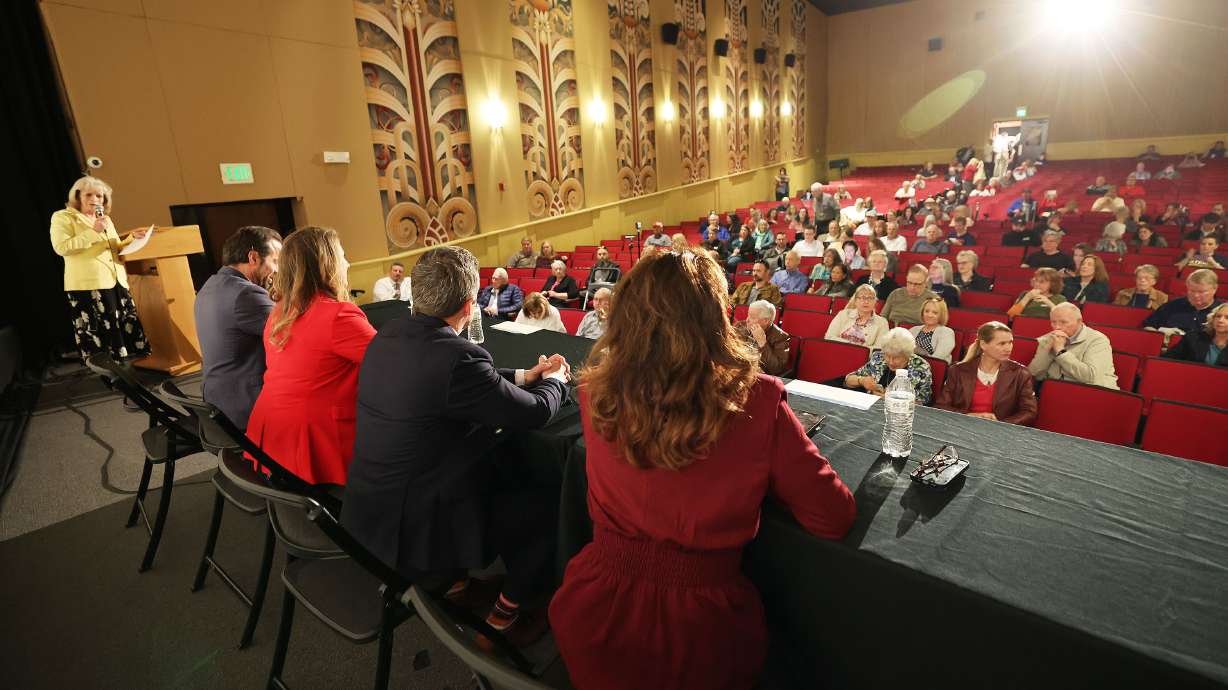Estimated read time: 4-5 minutes
This archived news story is available only for your personal, non-commercial use. Information in the story may be outdated or superseded by additional information. Reading or replaying the story in its archived form does not constitute a republication of the story.
OREM — Utah's candidates for attorney general share similar opinions on abortion, illegal immigration and "federal overreach" in land use and education, but they express differences in how they hope to serve.
That was the focal point Wednesday during a debate hosted by the Utah Eagle Forum at the SCERA Center for the Arts in Orem, as the candidates spoke to a crowd of about 300 Republican state delegates.
The field of candidates for Utah's attorney general includes former lawmaker, legislative chief of staff and chairman of the Utah GOP Derek Brown, former assistant attorney general Frank Mylar, Utah Division of Risk Management director Rachel Terry and former Zions Bank vice president and current chief of staff and general counsel for OmniTeq Trent Christensen.
Approaches to office
All candidates conveyed strong anti-abortion sentiments, the desire to crack down on illegal immigration and disdain for "federal overreach" in land use and education. They also said they see election integrity as a serious battle to be fought if they win the office, all expressing support for in-person voting with identification required. Christensen and Terry were vocal about supporting the reelection of former President Donald Trump, while Brown praised his Supreme Court nominations.
"If there's three things that Biden can't undo that Trump did, it's (Justice Neil) Gorsuch, (Justice Brett) Kavanaugh, and (Justice Amy Coney) Barrett," said Brown, who previously served as Utah Sen. Mike Lee's former deputy chief of staff.
Brown was chairman of the Utah Republican Party from 2019 to 2021 and served four years in the Utah House of Representatives. He was the first to declare his candidacy for attorney general and was the only one to seek a nomination using both the signature gathering process and the convention process.
As far as the office goes, each of the candidates say they have their own vision of how it would function. Christensen seemed to have the most aggressive litigation platform, saying he would "drain the Salt Lake swamp" and implement a "broken windows policy" similar to Rudy Giuliani — going after crimes he says are not regularly prosecuted.
In additional to his roles at OmniTeq and previously at Zions Bank, Christensen was the CEO of a venture capital nonprofit and regional finance director for Utah Sen. Mitt Romney's 2012 presidential campaign.
"Several of my strategies, just so you know, are intended to get the federal government to sue us," he said, so his office would be able to bring arguments to federal courts and "make sure we're doing it the right way."
Christensen said he would "use that entire army of 300 litigators" to restore election integrity, support law enforcement and secure the border.
Terry, who also served as an assistant attorney general in the Utah Attorney General's Office and as the deputy director for the Utah League of Cities and Towns, said her focus would be on federal overreach as it relates to public lands, energy and education.
"The federal government is trying to tell the state of Utah where your girls can play sports, where you can drive your side-by-side, and how you can access your food," she said. "This is unacceptable."
The technical side of the job held special weight with Terry, who says she will be "in the weeds" with the office's litigators as they rely on the attorney general "to consult on precedent, on cases, those that have statewide implications." Working with the attorney general's office in her current role, Terry feels she has developed strong relationships that will serve her in the future.
Brown hopes to use his years of lobbying and working with legislators to help set vision and policy.
"We have what I think is probably the most conservative Supreme Court of our lifetime," he said, explaining he hopes to use this as an opportunity to file suits against the federal government, specifically challenging federal lands in the state and unelected regulators.
Brown said he would work to build a coalition of other conservative attorneys general to further these goals. "A lot of my experience has been not necessarily the litigation of this, but the policy, the vision," he said.
Mylar, who could not attend the debate due to a federal jury trial, sent his wife Debby Mylar to read talking points. He was an assistant attorney general in the Utah Attorney General's Office from 1988 to 1998; and owns a private practice focusing on constitutional and government litigation, law enforcement, civil rights and religious liberty, according to his website.
Mylar leaned into his background of criminal litigation and, according to his wife, "plans to work with the Legislature and the sheriffs to make it a felony to transport illegal immigrants by bus, by plane or any other means into Utah." Along with immigration and federal overreach, Mylar wrote of his intentions to intervene in transgender bathroom and sports rulings. "He is concerned about protecting girls' bathrooms and girls sports," Debbie Mylar said. "The girls' bathroom and sports issue is a religious freedom issue. It's a privacy issue. It's a safety issue."
The Republican convention for Utah attorney general will take place April 27. Wednesday's debate, including GOP Senate candidates, is posted on the Utah Eagle Forum's Facebook page.










